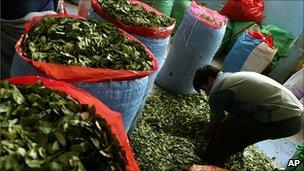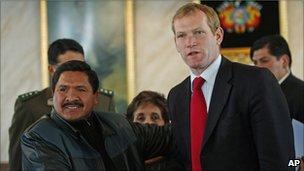UK boost for Bolivian battle against cocaine production
- Published

Bolivia acknowledges half the land under coca production supplies drug traffickers
The British government has announced a new co-operation deal with Bolivia in the fight against drug trafficking.
During a two-day visit to Bolivia, Britain's Minister for Latin America, Jeremy Browne, said the Serious Organised Crime Agency in London will join forces with the counter-narcotics police in La Paz.
Significant quantities of Bolivian cocaine end up on the streets of Britain.
An example of the co-operation that already exists between Britain and Bolivia in the fight against drug trafficking was shown off during the ministerial visit.
Mr Browne saw for himself how £500,000 ($800,000) from Britain has funded the building a forensic drug laboratory, which has proved successful in analysing and verifying evidence in drug smuggling cases.
And Mr Browne outlined the aim of British police working more closely with their Bolivian counterparts in future: "The main purpose of this co-operation will be to provide training on investigative techniques to combat drug smuggling."

Jeremy Browne (r) aims to enhance the investigative techniques of Bolivian police
The collaboration would also help improve border control, he said.
And he recognised Britain's responsibility as one of the top consumers in Europe of Bolivian cocaine: "We are trying to reduce the demand for drugs in Britain, but we also realise that we do have a responsibility to try to reduce the supply."
Mr Browne called on the Bolivian government to reduce its production of coca, the raw material for making cocaine, which is grown legally in Bolivia for cultural and medicinal purposes.
According to the United Nations, more than 30,000 hectares (74,000 acres) are given over to coca farming in Bolivia.
The authorities acknowledge that half of that area supplies drug traffickers. Independent estimates of illicit cultivation are higher.
- Published30 March 2011
- Published26 January 2011
- Published16 June 2010